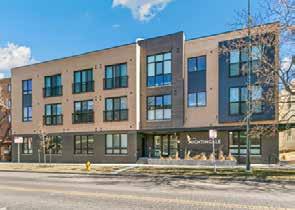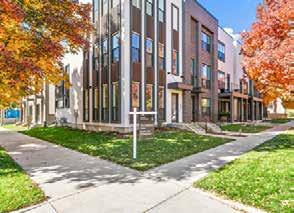




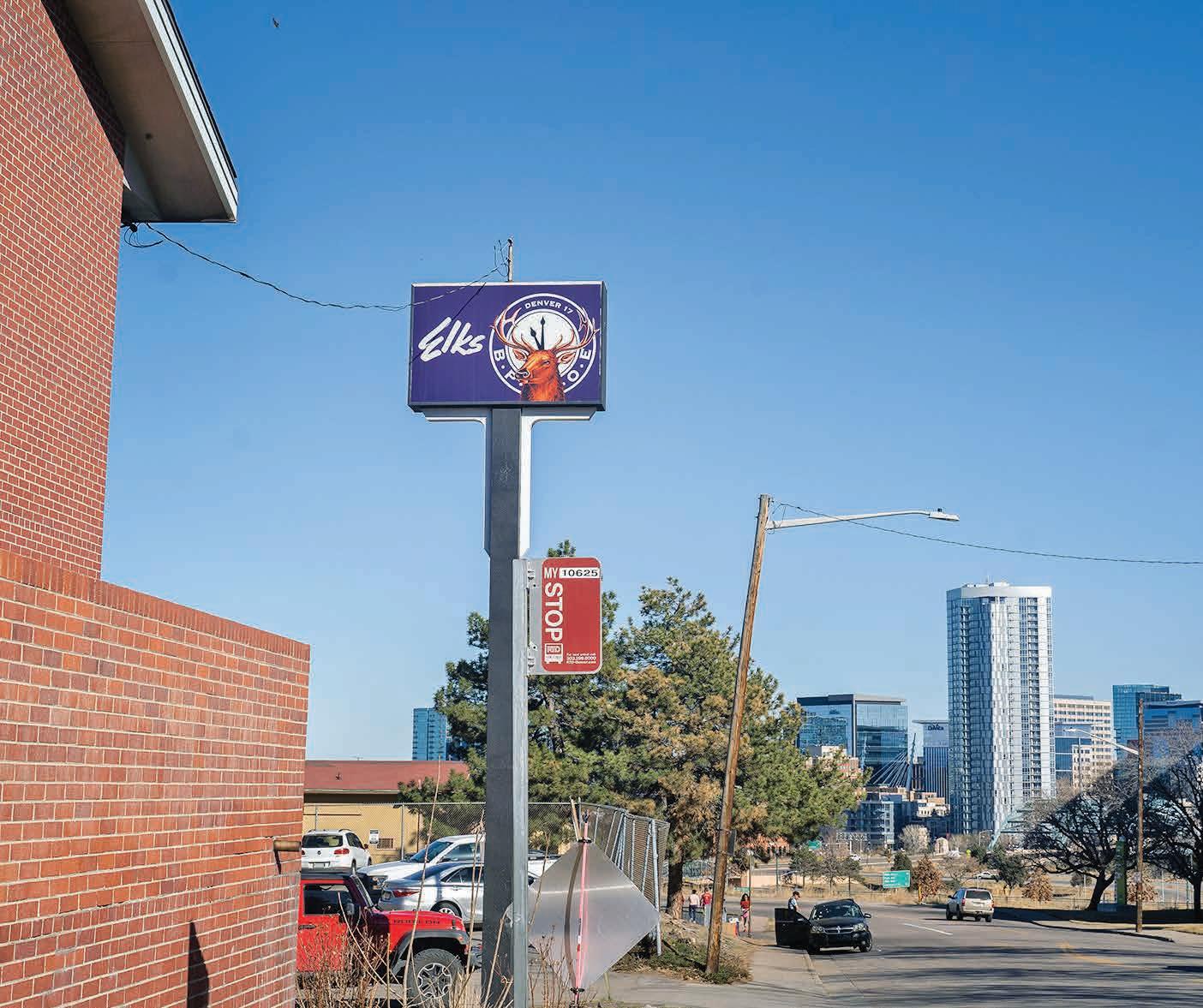

PAGE 6
PAGE
By Kathryn WhiteSpringtime brings change to Colorado’s estimated 300,000 elk.
Where the fall rut (mating season) brought the grunts and high-pitched squeals of bulls vocalizing their quest for mates–or defending a harem against outsiders–spring brings quieter shifts. Coats slim down to a summer layer, bulls shed antlers and pregnant cows spend their last months with the herd before each strikes out on her own to give birth.
A season of renewal comes to the other kind of Colorado Elks too, the 20,000 members across 55 Elks Club lodges. Elks renew their memberships this time of year and local lodges elect new leaders to assume roles like exalted ruler, leading knight, loyal knight and lecturing knight.
Denver Elks Lodge No. 17, at the corner of West 26th Avenue and Alcott Street, lost some high-ranking members of its herd in 2022 and 2023. When the annual membership renewal period ends this month, it will have lost some more.
A contentious meeting back on Oct. 22, 2022, set in motion a chain of events that left some who’ve since left the lodge wondering whether local changes to promote diversity and inclusiveness are sustainable within a national organization where a chain of command can be yanked from above at any time to set back their efforts.
In the end, a diverse group of women, people of color and LGBTQ club leaders–who had furthered the lodge’s philanthropy and helped it to regain financial stability–spent over a year jostling through legal action and other protests within the organizational apparatus before ultimately leaving the well-known public club.
The Denver North Star last covered Denver Elks Lodge No. 17 in December 2019, when the lodge was undergoing something of a revival. A group of parents from neighborhood schools had put on an event at the lodge and were later
inspired to join its ranks. They saw potential in an organization with such a clear charitable purpose operating out of a building with a great view of downtown and ample space for community events.
But first they needed to get the place back onto solid financial footing. Membership had diminished to around 200, with only a dozen or so active members, and there was talk of selling the building.
In September 2021, Westword reported on the lodge’s exalted ruler (aka president) at the time, Jim Wolf, who had created the lodge’s first diversity statement and was acknowledging the national organization’s exclusionary history. Lodge leadership was rapidly growing membership with Denver’s diverse population as its model. Wolf, and later others like Josh Crawford and Garrett Phillips, served as exalted rulers who brought new streams of revenue into the organization to put toward its community service work and cover monthly and maintenance expenses associated with the building.
The Benevolent and Protective Order of Elks (BPOE) was founded in New York in 1868 as a social club for minstrel show performers. Members got together over drinks, and when a fellow member fell on hard times, they’d pitch in.
The social-plus-service formula was aided in its rapid growth by the traveling nature of the minstrel show world at the time. By 1890, there were 173 men-only lodges across the country. Today that number exceeds 2,000, and over 1 million dues-paying members.
Early Elks were men whose minstrel repertoire included performance in blackface, but the lodge’s early days went well beyond leaning on racial caricatures to perpetuate racial stereotypes. Lodges excluded outright, or made membership difficult to achieve, for African-Americans, Italians, Jews, women, atheists and others.
By the late 1990s, more than a century after the organization’s founding, many local lodges had undergone moves to shed themselves of exclusive
Acommittee has proposed several major changes to Denver’s Ordinance 307, known also by its original campaign name, “Denver Deserves Sidewalks.”
The original ordinance, passed by voters in November 2022, called for sidewalk fees based on a property’s linear footage of sidewalk. Councilwoman Amanda Sandoval initiated a change to the ordinance that in October 2023, after discussion and concerns about postponing implementation, was unanimously supported by City Council. Fee collection has been delayed until July 2024 in order for a committee to make recommendations to address concerns such as residents on corner lots being charged higher-than-average fees and the burden of fees on lower-income residents.
The first major change proposed by the committee is a flat fee structure. Residents in single-family homes, or in a multifamily
As the Colorado legislative session hits its halfway point entering March, Sen. Julie Gonzales of District 34 and Reps. Tim Hernández, House District 4, and Alex Valdez, House District 5, have had a fairly busy start to the 2024 General Assembly.
Gonzales is a prime sponsor on nine bills that have either been introduced or passed in the Colorado Senate. Hernández is a prime sponsor on five bills in the House. Valdez is also a prime sponsor on five bills in the House. The bills cover a wide variety of issues impacting their constituents from electric vehicles to gun control to the justice system.
Gonzales is currently in the second year of her second term that began in 2022 and will end in 2027. In this legislative session, Gonzales is the chair of the Judiciary Committee, vice chair of the Local Government & Housing committee and is on the Appropriations Committee.
Hernández is filling a vacancy in House District 4 and is running for a full term that would begin in January 2025. Hernández is on the Health and Human Services Committee and represents the majority of North Denver.

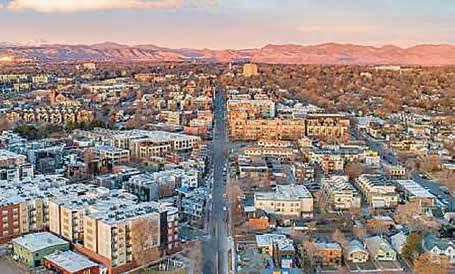
It's not just news.
Editor:
Thank you for Celeste Benzschawel’s article on the BRDG Project in the Feb. 15 issue of The Denver North Star. This gallery is a wonderful addition to the neighborhood that I’ve resided in since 1982.
A few weeks ago, I attended the panel discussion that accompanied the “Original Rebels” show. It stirred many fond memories. But something was missing from that discussion, from Benzschawel’s article and also from Rebecca Hunt’s column on the Navajo Art District in your January issue.

That something is Spark Gallery, and I am writing today to add a little about Spark’s history to the pages of your publication.

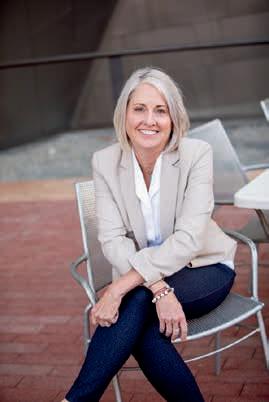



Spark was in fact the first co-op gallery to be established in the Navajo Art District. It was founded in 1979 by recent art grads from CU Denver and CU Boulder, as well as some faculty; and it was the sole gallery on the block until Pirate arrived in 1980. Edge moved in soon thereafter and critical mass was achieved. I was one of hundreds of visitors to the district who would take in all
three shows on Friday evenings, often with my longtime partner Clark Richert, a founding member of Spark. Artists often gathered at “Art Bar'' prior to shows, where openings were promoted, invitations distributed, art issues discussed, and beer and pizza or burgers flowed at venues such as the Wazee Supper Club and Two Mule Inn.
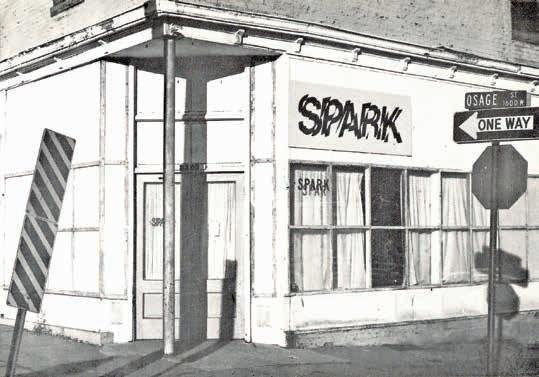
For decades, Spark exhibited some of the best art in the area, representing such artists as Clark Richert, Paul Gillis, Andy Libertone, Margaret Neumann, Patty Ortiz, George Woodman, Jerry Johnson, Charles DiJulio and John Fudge. Many other fine artists followed.
Ultimately, Spark gallery moved to the S. Santa Fe Art District, where they’ve operated ever since. The building at 33rd and Osage was razed and the lot remains vacant.
Together, these art co-ops served as an invaluable contribution to the arts in Denver and the arts; and my hope is that arts and culture will continue to thrive through BRDG and other cultural venues.

Marilyn Nelson, Margaret Neumann, Clark Richert, Suzy Roesler and George Woodman.

~ Barbara Ittner Denver, CO 80211
Historic Elitch Theatre will offer a oneweek summer camp for kids, June 10-14. Led by experienced instructors and theater professionals, campers will engage in a variety of activities designed to develop their acting, singing and dancing skills.
"Our summer camp offers a unique opportunity for children to explore the world of theater while being surrounded by the rich history and ambiance of the Historic Elitch Theatre," said Roberta Hamilton-Griggs, summer camp coordinator at Historic Elitch Theatre.
"We're thrilled to provide a fun and educational experience that will leave a lasting impression on young performers,” Hamilton-Griggs continued.
Campers will participate in a range of workshops and activities tailored to their age and skill level. From improvisation games and character development exercis-
ADVERTISING
PUBLISHER:
NEWS
ADVERTISING
es to learning choreography and rehearsing scenes, every aspect of the theater will be explored in a supportive and encouraging environment.
The one-week camp will conclude with a showcase performance, where campers will have the opportunity to demonstrate their newfound talents and skills to family and friends in the historic theater. This culminating event will celebrate the achievements of the campers and showcase the creativity and dedication they have demonstrated throughout the week.
The camp will be conducted in cooperation with Theatre Source for Kids, an educational and informational resource for kids and parents who are interested in theater.
Visit historicelitchtheatre.org/eventsprograms/camp for more information or to register. For questions, contact 2024Camp@ HistoricElitchTheatre.org.
DISTRIBUTION:
Fifteen eighth-graders from Skinner Middle School filed into an auditorium on the CSU Spur Campus bright and early Jan. 23.
And they had done their homework.
They were there to attend the first ever ClimateCon! Colorado conference. By day’s end, over 300 attendees—largely adults from a variety of environmental fields, government agencies and earth-friendly businesses—had attended 30 sessions falling into themes like “reductions,” “removals” and “adaptations.”
Gov. Jared Polis addressed the crowd early in the day, then music and performers dressed as molecules helped attendees find their way to break-out sessions throughout the Hydro building.

Session topics ran the gamut: Hispanic Americans and Environment Justice, Pollinators and Biodiversity, Federal Grants for Rural Clean Energy, Decarbonizing Buildings and more.
This was not your ordinary field trip. Students submitted applications to their social studies teacher, Kassandra Montoya, in order to attend.
Nickie Wells, environmental justice director at Black Parents United Foundation, made the trip possible through a grant from her organization.
“I wanted the kids to go to ClimateCon! and feel like they were seen and heard,” Wells said by email after the conference.
“Of course I wanted them to get an educational experience and step away feeling inspired and encouraged to be a part of


the change,” Wells continued. “I never doubted these eighth-graders for a minute. They showed up and showed out and kept the adults on their toes.”
The Denver North Star visited Skinner the week after the conference to hear from the students.
“I never doubted these eighthgraders for a minute. They showed up and showed out and kept the adults on their toes.”
– Nickie Wells, environmental justice director at Black Parents United Foundation
“It was really inspiring,” one student said. “The government keeps talking about electric cars and adding all these new streets. But



ticed to them that this session had fewer attendees than the others. Another sparsely attended session was on climate education, a topic of keen interest to the group.
“That was really surprising because one of the biggest problems is that not many people truly understand what climate change is,” one student said.
“I was glad that I went to that breakout group,” the student continued, “because I learned a lot about different educational tactics you could use to educate future generations. One of them was about how insects are very important to our climate. They have a very big impact that not many people would realize.”
A couple of students were eager to talk about a local example of regenerative farming that employs something called agrivoltaics. Jack’s Solar Garden is a 24acre farm in Boulder County where over 3,000 solar arrays have been built on elevated posts and provide partial shade for crops and grazing underneath.
in reality, we actually have to fight for climate justice.”
Two students were struck by information showing that the habits of wealthy people generate a disproportionate amount of pollution, yet they aren’t the ones to suffer the greatest health impacts from it.
Several attended a session about women and other underrepresented people working to fight climate change. It didn’t go unno-



“A common theme across all the panels I went to,” one student said, “was to just speak up, support those ideas that are forming by people who are trying to make the world a better place. If you're just staying quiet and wanting change to happen, change won't happen.”
Wells will be back at Skinner in April to continue exploring themes of environmental justice and advocacy with students. And Wells will provide similar opportunities to fifth-graders at Trevista at Horace Mann this spring.
Conference founder and organizer Michael Scanlon said he is planning ClimateCon! for Boulder April 2 and Fort Collins Aug. 27. The conference will return to Denver in January 2025.








For years Suncor Energy has dominated local news about air pollution. But what else is causing air pollution in Commerce City?
Based on data from an independent air monitoring study presented by Cultivando last year, hydrogen sulfide could be a significant concern for the region. For those not familiar, hydrogen sulfide is the rotten-egg smell that makes your nose wrinkle when it wafts by. It also causes health impacts such as headaches, sore throats and difficulties breathing. But where the excess toxin is coming from hasn’t been fully settled.
According to one lead scientist, Suncor probably isn’t the only source.
“Hydrogen sulfide is a really interesting and unique airborne contaminant,” explained Detlev Helmig, who led the independent air monitoring study in Commerce City. “For most of these gases, it takes complicated and highly sensitive monitors to track the concentration levels. Hydrogen sulfide is different though, because it is a strongly odorous gas. So, people can smell its presence in the air. In our one-year monitoring program, we recorded it above the odor threshold 7,557 times in Commerce City compared to zero times in Broomfield, where we ran exactly the same type of monitor during the same time period.”
The odor threshold, according to Helmig’s presentation last year, is defined as greater than eight parts per billion in 2022, and Helmig explained how his team was able to identify multiple sources of hydrogen sulfide after accounting for air transport. One prime suspect? It comes “straight from the direction of the water treatment plant.”
The facility referenced is Metro Water Recovery (Metro), but Helmig’s data has presented a conundrum for state monitoring agencies that haven’t been able to confirm similar elevated levels of hydrogen sulfide at the wastewa-




ter facility. For its part, Metro Water Recovery acknowledges hydrogen sulfide is an emission during the wastewater treatment process, but it’s adamant the facility is in full compliance with air permits and emphatically denies exceedances of hydrogen sulfide.
“Every day, Metro Water Recovery treats an average of 138 million gallons of wastewater from homes and businesses,” read a statement from a spokesperson at Metro, adding, “Human wastes contain sulfur. Hydrogen sulfide is produced when the organisms in the wastewater treatment process are breaking down the sulfur that is present in the wastewater. Metro controls the hydrogen sulfide levels that are generated by adding an iron-based chemical to the anaerobic digestion part of the treatment process.
“Metro has not had any exceedances of H2S from any facilities and is 100% compliant with the air permit requirements… The permit has a 3-hour rolling average of 1,680 ppm. The facility has not had an exceedance of that limit. The monitoring is completed on the gas stream prior to combustion at the facility.”
A spokesperson for the Colorado Department of Public Health and Environment Air Pollution Control Division supported Metro’s claim.
“The Air Pollution Control Division provides regular oversight and completes a comprehensive annual inspection of Metro Water Recovery & ENGIE each year,” read a statement to The Denver North Star. “Examples of some previous, minor air violations, include late report submittals, late Air Pollutant Emission Notice submittals, use of temporary rather than permanent signage, and failing to report all deviations. The APCD has not identified any violations regarding hydrogen sulfide as related to Metro Water facilities.”
The Denver North Star has previously reported on concerns regarding differences in air pollution monitoring between state requirements and independent teams, and whether such differences suggest the state process may not be rigorous enough in their requirements.
For example, the independent air monitoring team that was contracted by Cultivando for Suncor Energy often found substantially higher and more frequent air pollutant rates than did the state-regulated air monitoring programs at the oil and gas refinery. Differences in these results have been explained by the independent team as due to monitoring at multiple locations, monitoring continuously and using more sensitive instruments and data analysis.
Currently, it’s unknown if similar methodological differences might explain the discrepancies in recent findings for hydrogen sulfide levels, in part due to a lack of direct study and comparison between Metro’s monitoring and the study completed by the independent team. In an emailed statement, a spokesperson for the EPA claimed they’ve requested but have been denied access to the raw data collected under Cultivando to review for themselves.
“We understand Cultivando collected air quality data near Suncor’s facilities in 2022-2023 and presented their findings last March. EPA has requested the complete data files from Cultivando’s air quality sampling multiple times, so we may conduct a comprehensive evaluation, but have yet to receive this information.
“However, EPA continues to look for opportunities to support Cultivando and community members as they seek to develop information about air quality conditions in Commerce City, Elyria-Swansea and Globeville. Currently, there are funding opportunities available to North Denver communities through the Inflation Reduction Act, which will be the subject of upcoming outreach and community meetings.”
The new funding announcement comes after Cultivando elected to drop a previously awarded EPA grant for air monitoring last year after frustrations over the granting process. The grant money was unable to be passed on to another organization at that point, and was returned to the general fund.
Additional funds have also been secured by CDPHE to in part address elevated hydrogen sulfide levels among other pollutants. In February, the state agency announced a $10.5 million enforcement package against the Commerce City oil and gas refinery for multiple violations between July 2019 and June 2021. The fines will go toward a combination of penalties and improvement projects and are directly related to breaches by the Suncor facility only.
By The Denver North Star Staff“
Press Club, Regis University and Colorado Humanities.
For more information about the April 10 event, contact info@calmaco.org. For more about the annual Marcha, visit the Cesar Chavez Peace and Justice Committee of Denver on Facebook.
Domingo, Falcon, Jose Colorado AssoAuthors Press Club, Humanities. the April 10
For more the Cesar Committee of

In the coming years, West 38th Avenue will look a bit different on a 3-mile stretch between Sheridan Boulevard and Fox Street.
The road has been identified for improvements for safety; better biking, walking and transit; and green infrastructure. On Feb. 15, Denver’s Department of Transportation and Infrastructure (DOTI) kicked off a yearlong community engagement, planning and design process with a public meeting. Around 100 people showed up for the meeting on Zoom.

has been identified for an upgrade to a bus rapid transit corridor (BRT). It will join streets like Federal and East Colfax, where dedicated lanes and improved bus stops will allow buses to move more quickly.
Today the 38 RTD bus runs east-west along the corridor and serves as the main connection into downtown. Planners have identified the stops at Sheridan Boulevard and Federal Boulevard to be the two busiest in terms of daily boardings because they intersect with other high volume bus routes.
Continued from Page 1
residence on a single parcel, would pay about $148 per year. Multifamily residences with more than one home on a parcel would pay about $28 per year per unit.
The second major recommendation is to enact discounts for income-qualified homeowners. These would mirror instant rebates currently offered on solid waste collection. Those rebates start at 50% off for residents at 60% or less of the area median income (AMI) and go up to a 100% rebate for residents that are at 30% or less of AMI.
The third major recommendation is to give Denver’s Department of Transportation and Infrastructure (DOTI) flexibility on the original nine-year timeline due to increases in construction costs.
West 38th Avenue is on Denver’s high-injury network, or the small percentage of city streets that account for a disproportionate number of injuries. Since September 2018, there have been 23 serious injury crashes and six fatal crashes on West 38th.
Two of the six fatalities were pedestrians and one was bicyclist Logan Rockline, who was killed in a December 2022 hit-and-run while on his way to dinner.
The project hopes to address these safety issues with new infrastructure and improvements to the road, especially for pedestrians, transit users and people who bike.
In addition to crashes, residents called out that the street can just be uncomfortable for pedestrians. The current walking environment on the street is less than great. With sidewalks that are often substandard in terms of width, positioned uncomfortably close to the road and are often covered in snow during the winter when plows push
snow from the road onto them. One meeting participant, Ken Auge, mentioned “someone almost ran over my 90-year-old mother at 38th and Tennyson.”
During the meeting, widening sidewalks and improving bus stops were the highest priorities attendees indicated in an online poll. Various residents also mentioned a desire for red light and speed cameras to make the street safer.
Residents will have two more opportunities to give their input at public meetings. The next one will be this summer, when DOTI planners will discuss potential tradeoffs and gather input for potential design options. Based on that input, in the fall or winter DOTI will present a preferred design alternative for the corridor for residents to comment on. Near-term, low-cost, quick-build changes will start to show up on the avenue as early as 2025.
In terms of mobility, West 38th Avenue
Jason Miller, one of the consultants on the project from Fehr & Peers, discussed that RTD route 38 has problems with on-time performance. They like to see 80% or higher on-time performance. The 38 was greater than four minutes late nearly 70% of the time during the afternoon rush hour. Dedicated BRT would increase on-time performance, allowing buses to go around vehicle traffic in a dedicated lane. That said, residents may have to wait a few more decades as planners indicated BRT won’t be ready until the 2030s or potentially even the 2040s.
DOTI is requesting community input through an online survey that is open through March 31. It can be found at bit.ly/ w38thavesurvey
Residents who want to be kept up to speed on the project can sign up for email updates by contacting DOTI project manager Phoebe Fooks at phoebe.fooks@denvergov.org.
Allen Cowgill is the City Council District 1 appointee to the DOTI Advisory Board, where he serves as the board co-chair.
Denver City Council will consider recommended changes to the ordinance in the coming months.
Allen Cowgill is a member of the Ordinance 307 Committee.
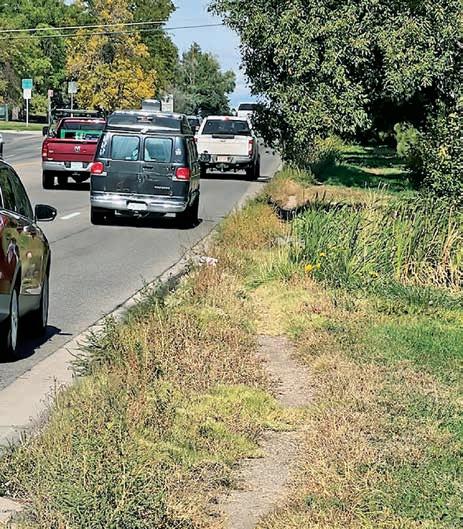




M“y Brilliant Divorce” opens with a woman talking about how her husband left her; what ensues is two hours of fun. Yep, fun. That might not be what you would expect with such a topic, but it works.
This one-woman show about divorce is a favorite in the theater community. The play ran on The West End in London for years and was nominated for an Olivier Award. Now, you can catch a performance at The Bug Theatre in North Denver, starring renowned local actress Denise Perry Olson and directed by industry veteran Richard H. Pegg. The show is entertaining, but it also takes a serious look at what it means to be human.
The play explores mature topics (sex, divorce, dating, vibrators) that could be “perfect for a girl’s night out or cathartic for women going through a breakup,” said Pegg. According to organizers, “My Brilliant Divorce” “strikes a chord for any woman who has been through one, and for everyone else, it is an engaging heart-to-heart with a friend who is far funnier and more entertaining than your real life ones in suffering mode.”
“Art is important because it allows us to look inward,” said The Bug Director Alex Weimer.

And “My Brilliant Divorce” isn’t the only performance at the theater encouraging attendees to look deeper this month. North Denver theater-goers can also catch a performance of “EXPOSED Storytelling,” a theatrical, true-storytelling experience focused on community healing through shared traumatic stories from the past. It can be intense, but director Josie Nixon is a master at bringing the audience back from the edge. At the end, the audience and storytellers may experience a sense of healing, connection and understanding.
Weimer points to the importance of live experience to create different but shared experiences. Located on Navajo Street near 37th Avenue,The Bug is an ideal locale to
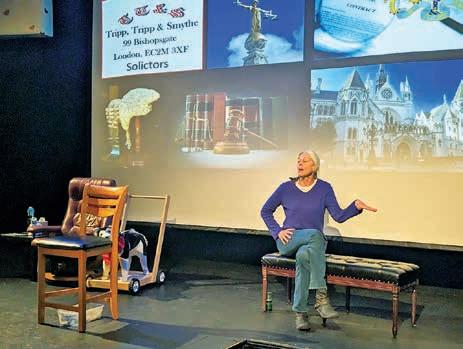
build community while experiencing live performance, whether humorous, intense or simply entertaining.
"The Bug is a place where all sorts of things happen," Weimer said.
Interim marketing manager Eileen Agosta added, “our mission is to make the arts accessible to everyone in our community, and to open our space to as many different kinds of shows as possible.”
This kind of accessibility fuels innovation and exploration, making The Bug a haven for emerging and seasoned artists alike.
“I’ve worked at the Bug as long as I have because I believe in what happens there. I like helping people get their show up. It’s a rare place to work and it’s even rarer to have these places around anymore,” said Weimer, who has been at The Bug since 1998.
For those wanting to explore the tough stuff through quality storytelling and raw performance, The Bug is the place to be this month.
“My Brilliant Divorce” runs at The Bug on Fridays and Saturdays from March 1 through March 23.
“EXPOSED Storytelling” will play at The Bug March 18 and once a month through June.
Visit bugtheatre.org/calendar for more information.

on Feb. 19.
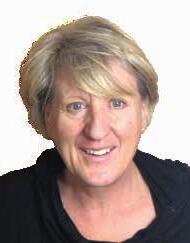
Over 30 years ago, Dr. Rudine Sims Bishop wrote an essay about the need for “Windows, Mirrors and Sliding Glass Doors” in literature. Windows give you a view into a life experience different from your own, mirrors reflect your life experience back to you and sliding glass doors let you step into a world created by the author.
Dr. Bishop was referring to children’s literature and the need for children of color to see themselves reflected in the books they read. While neither children nor race are centered in this month’s review, the short-story
anthology “Soul Jar” edited by Annie Carl provides windows, mirrors and sliding glass doors through 31 science fiction and fantasy stories by disabled authors.
Protagonists with visible and invisible disabilities navigate post-apocalyptic societies, have adventures in space and fraternize with magical beings. The book’s title comes from the story “Delbrot, Peace Warrior!” by Holly Saiki, wherein Delbrot, a lich (an undead being), wears a bracelet that contains his soul, otherwise known as a soul jar. Whoever has the bracelet controls him, and an evil necromancer once used the bracelet to manipulate the gentle, once-living boy into murdering
experiencing live humorous, intense
of things Eileen Agosta arts accescommunity, and to different kinds of innovation haven for as I have there. I like It’s a rare have these Weimer, who tough stuff raw perforthis month. The Bug on 1 through play at The through June. for more
Denver is a music city. On any given night, we can see headlining acts at world-class venues like Red Rocks, DPAC and Mission Ballroom, but what we have less access to are high-caliber musicians performing in intimate settings. That's precisely the void that Music Appreciation Society (MAS) has been designed to fill.
MAS is a 501(c)(3) founded in 2015 by Denver real estate executive David Spira, who said, "I was inspired by my frequent travel to bring artists to Denver that weren't otherwise including the city on their tour routes. I wanted to increase the diversity of
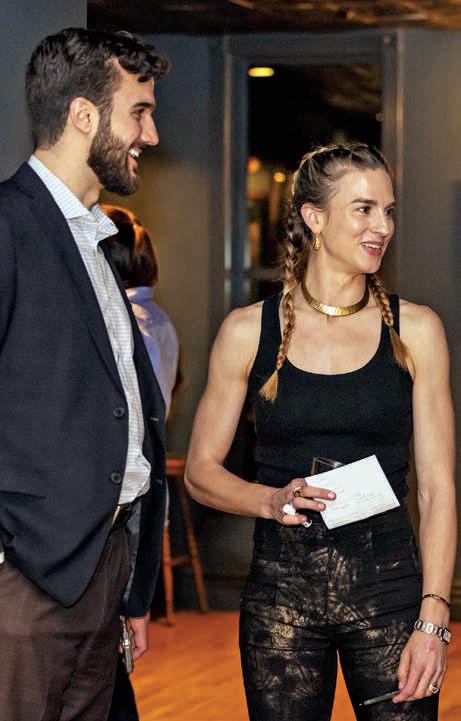
music available here and present the music in a more stripped-down environment than is typically found."
Like many close-knit gatherings, MAS took a hiatus starting in 2020. This year, they're back under the leadership of Managing Director Elizabeth Irby. Irby is a North Denver resident with a background in live music and energy efficiency finance — she's been tour manager for an international string chamber orchestra, holds a master's degree in music business from Berklee College of Music and launched a music nonprofit in San Francisco that worked to increase revenue streams for local artists. Now, she brings her expertise and passion for stimulating local music scenes to Denver.
Irby thinks this is an exciting time for Denver arts and culture. "There are a lot of energized people bringing compelling experiences and alternative concepts to life, but there is still room to grow, particularly on the live music front," she said.
"There are not many places, as found in some other big cities,” Irby continued, “where you can catch an accomplished blues and soul singer one night and a Celtic harpist the next, and do so in an intimate and engaged setting."
MAS relaunched their programming Feb. 15 with a show by Jolie Holland. Holland is a talented musician whose presence calms and voice mesmerizes. Her work has gained praise from the likes of Tom Waits and Lou Reed. Her February show was the first time she has played in Denver since 2014.
Like all of MAS's upcoming 2024 performances, Holland's show took place at The Savoy, a charming space in RiNo that allows for craft cocktails, pre-show conversation and the ability to enjoy exceptional musi-
Congratulations to two North Denver authors whose books were recently published.
“TOP 3 FIX” BY
RICK OLDERMAN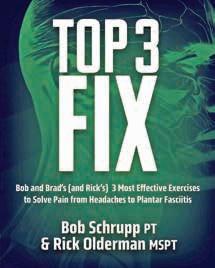
When The Denver North Star last caught up with Rick Olderman in 2022, he had sold his physical therapy clinic in North Denver and was adding a raft of new skills to his 25 years in the profession. He focused his work on helping people with chronic pain issues, and he took up what he described to columnist Kathryn White—a bit cryptically at the time—new forms of writing.
In January 2024, Olderman released “Top 3
Authors’
Annie Carl sliding glass and fantasy invisible dissocieties, fraternize with comes from Warrior!” by Holly undead becontains his soul, Whoever has evil necromanipulate murdering
Fix: Bob and Brad's (and Rick's) 3 Most Effective Exercises To Solve Pain from Headaches to Plantar Fasciitis.” The book came out of a partnership between Olderman and Robert Schrupp of the popular YouTube channel “Bob & Brad.” The channel has amassed over 5 million subscribers for its physical therapy tips and advice.
Olderman appeared live online with “Bob & Brad” for a session focused on lower body and back pain, and Olderman’s own YouTube channel at @RickOldermanPT is also quite active. Olderman is hard at work on his next book, which he expects to publish later this year. You can find him at www.rickolderman.com.
“THE JOY DIVISIONS” BY SCOTT DIMOVITZ
Regis University English professor Scott Dimovitz’s first novel, “The Joy Divisions,” came out in November. Through his characters, Dimovitz delves deeply into the early 1990s

cians with little frills. "So often concerts are about the spectacle, but we want to present shows in a way in which the music is the main attraction," said Irby.
I attended Holland's show (thanks to a generous comp by MAS) last month, during which the musician’s elevated talent was indeed the main attraction. The room was full of people who were excited about music. Like myself, they may never have heard of Jolie Holland before, but by the time the first song ended, everyone was captivated.
Upcoming MAS performances include cellist, pianist and vocalist Gabriel Royal; blue beat guitarist and vocalist Quinn De-
Veaux; composer, conductor and multi-instrumentalist David Amram; and Celtic harpist Maeve Gilchrist.
Denver-based musicians will also take the stage in several MAS shows. DeVeaux will perform with local musicians Dave Guy, Paul Dehaven and Mark Anderson. Hugh Ragin and Yumi Hwang Williams will play alongside Amram.
No matter your music interests, there is an opportunity for exploration with MAS.
As DeVeaux said, "Can't sleep on the Denver music scene."
Visit maspresents.org for the full 2024 calendar.
world of Allentown, Pennsylvania, connecting local circumstances and developments with national events like the first World Trade Center bombing, the siege at the Branch Davidian Waco compound and the passage of NAFTA.
“I was initially inspired by events that happened in my young adulthood, when the textile factory where my father worked suddenly closed its doors after over 100 years, upending their entire local world,” Dimovitz said on the Regis University website in November.
“I also wanted to depict a vibrant working-class culture,” Dimovitz added, “which often gets stereotyped as a bunch of unintellectual hillbillies rather than as individuals with their own complex interests and passions.”
The book is dense with micro-histories and commentaries told from the vantage points of characters ranging from an artsy college dropout to devoted union members to the seriously religious. Not to mention a mysterious visitor to town with an unsettlingly hidden agenda.

The book provides clever plot twists along its way to informing and reflecting on history, before a wholly unexpected ending begins unfolding in the book’s final chapters.
Dimovitz published an academic study on British postmodern feminist novelist Angela Carter in 2016 and is now working on two more books: “(Post)Apocalypse Now! Postmodern Literature at the End of Time” and a novel, which will again connect in-depth local history with broader sociopolitical themes. This time, Dimovitz will focus on Denver, where he has lived since 2008.

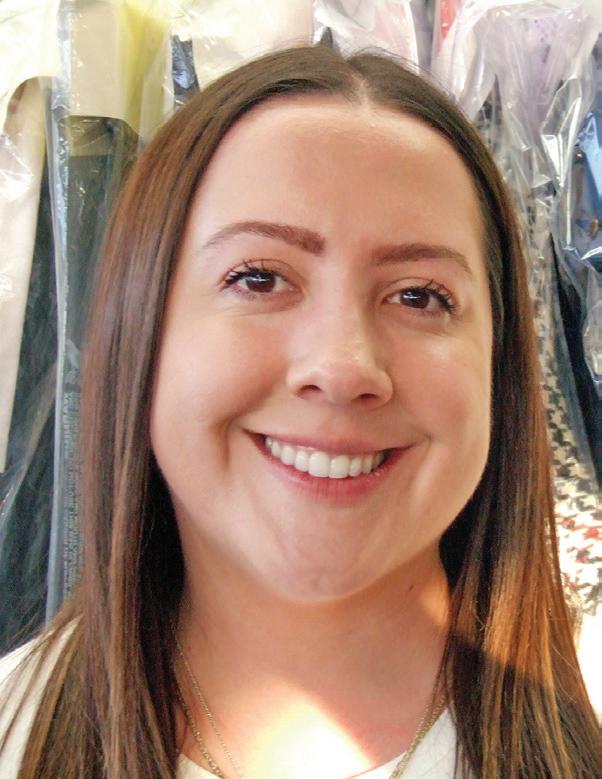






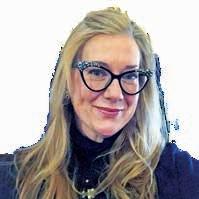 ERIN OLYER ROHLF, LCSW
ERIN OLYER ROHLF, LCSW
If you're like me, you'll have an urge to fling open the windows on these spring-like, 60-degree days we Denverites enjoy, despite it technically being winter. Not so fast, though. Let’s talk about VOCs, AQI and other air-related acronyms first.
How air quality affects our mental health is critical, but not frequently talked about. Poor air quality, whether outdoors or indoors, has been shown to negatively affect mental health, and is suspected to increase depression, anxiety as well as other mental disorders. In fact, some researchers are bold enough to claim that poor air quality can exacerbate serious mental illnesses, like schizophrenia. In fact, British researchers have shown that high levels of serious mental illness happen in places where air pollution is greatest.
Pollutants and particulates in the air we breathe impact both our lungs and our brain. What's more, indoor air has often been shown to be more polluted than outdoor air, thanks to the host of chemicals, cleaning compounds and other toxic vapors we’re awash in daily.
So what can we do to clean our air and thus support our mental health? Turns out, plenty.
Since on average, Americans spend about 90% of their time inside, let’s start there.
Start with airing out your home regularly by opening doors and windows for a full 10 to 15 minutes, as often as you’re comfortable with. Doing so flushes out indoor pollution like smoke, mold growth, and cleaning products and off-gassing household items that emit volatile organic compounds (VOCs), like some furniture (gross!).
Next, know the day’s AQI, or air quality index. AQI is the daily report of the ozone, carbon monoxide and particulate matter levels in the air. You can find it on the weather app on your phone and a host of other places.
AQI is calculated by data stations throughout the city surreptitiously gathering intel on air. There’s one at 45th and Navajo, for example. Check the AQI before flinging open the windows—the idea is to release indoor pollutants, not add new ones from a wildfire downwind.
Next, filter what your lungs are taking in for optimal mental health. The American Lung Association provides interesting information online about a DIY air filter that can be created using a box fan, a 20-inch filter (rated MERV, minimum efficiency reporting value, 13 or better) and duct tape. Tape the filter in front of the intake flow of the fan to filter out nasty particulates. Recycle the filter when it gets yucky. It’s that simple.
Looking for something a bit more aesthetically pleasing than a duct tape project? Luckily, there’s a vast array of air filters for the home to be purchased online or at your local hardware store, ranging from an elegant desktop contraption to a room-size system.
Best plan yet? Buy and cultivate house plants. NASA did a study in the 1980s that suggested plants and associated soil can be used to reduce indoor pollutant levels. More plants equals less carbon dioxide in a room— plus points for charm and positive feng shui.
Personally, it’s just the excuse I need for a splurge session at The Terrorium Shop (4416 Yates St.). Their window display of discarded mannequin parts upcycled into imaginative planters is equal parts mirthful and weird. There are also The Plant Room (1937 Federal Blvd.), Tigerlily Goods (3795 Grove St.) and a handful of other North Denver plant stores. Consider it an investment in your indoor air and mental well-being.
More plants are always a good idea, and if you’re so inclined, choose plants that perform double duty with some physical health benefits like an aloe vera plant for healing, or mint for a tincture or tea as an
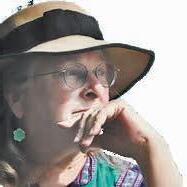
March is Women’s History Month. As it happens, I have more material on the accomplishments of early Northside women than I can do in one month. So, I will be writing a series of women’s history columns. This month I will share the story of Dr. Rose Kidd Beere and the State Home for Dependent and Neglected Children, which was housed in our neighborhood.
For April, in honor of Earth Day, I will document the role of the Northside in developing Denver’s community garden system. In May, I will write about the Northside Women’s Club, and how they created the Northside Neighborhood House and worked to improve the quality of life on the Northside.
Women’s suffrage was an important issue for Colorado, Denver and Northside women beginning with the territorial period. Women in the West were vital workers in building a new city and a new society. Denver women were activists including educators, lawyers, doctors and eventually politicians who helped change society for the better. Both the University of Denver and University of Colorado allowed women into their law and medical schools.
In 1875, the first group of suffragists petitioned the members of the constitutional convention to add women’s voting rights to the new state constitution. Although that persua-
sion failed, it did get women the right to vote in school elections and to hold school offices.
A second campaign in 1893 was more successful when the men of the state voted to grant women the full franchise. The Northside Women’s Club, a progressive organization, worked hard to promote women’s voting rights. This opened the door to three women serving in the state assembly in 1898. These women joined other progressives in passing legislation that established a number of helping institutions. One was the State Home for Dependent and Neglected Children.
Enter Rose Kidd Beere.
Rose Kidd Beere was a doctor in Colorado in the 19th century. Her long career saw her serving mostly in public health positions, and she was often the first to take a leadership role in a public organization. She did all of this while she was single-handedly raising three sons.
Born in Indiana and raised at western military posts, Rose married a young attorney named Edmund Beere, and their three sons were born by the late 1880s. After being widowed, Rose trained at the Northwestern University Women’s Medical College. In 1892, Dr. Beere moved to Durango, Colorado, to practice medicine.
In the early 1890s the new state assembly passed a law that established an institution to care for neglected and deserted children from around Colorado. They purchased a building that had been the Baptist orphanage, located at 633 Bert St. (3223 Vallejo), in North Denver.
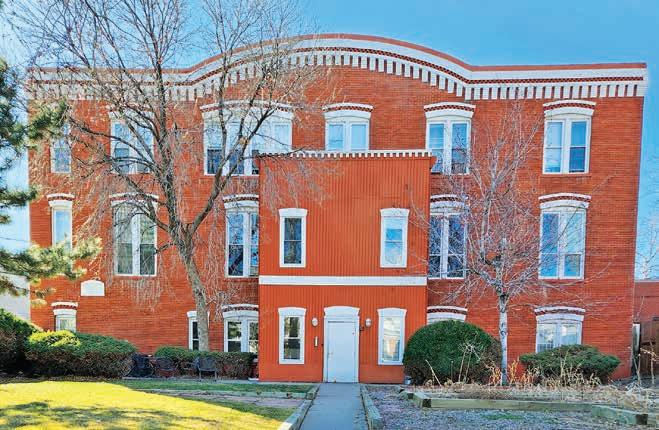
In 1895 Gov. Alva Adams asked Dr. Rose Kidd Beere to take over as the first superintendent of the new State Home. Rose and her sons Donald, Edmund and Robert left Durango and moved to Denver, where they lived on the top floor of the Home.
In 1896, the first year of operation, they housed 60 children. The State Home stayed in North Denver until it outgrew the building. In 1920, it moved to 2305

How many hours do you sit in a normal day? According to the CDC, if you’re like the average American, the answer is six-and-a-half to eight hours. That might sound shocking, but if you take into account driving, desk work, reading, Netflixing … it adds up.
Even if you are among those at low risk for developing adverse consequences –people who sit less than four hours a day – the CDC says that after just two hours of sitting most people experience musculoskeletal discomfort and a decrease in metabolic activity. Sitting all day can comprise a person’s sleep quality, mental health, hormonal balance, bone density and even creativity.
It sounds pretty scary, but don’t worry.
Even just short bouts of movement sprinkled into your day can mitigate and reverse these effects fairly quickly. Thirty seconds of movement every 20 minutes is what I aim for.
I use the moves in this graphic in no particular order or just move any way I'm inspired to. Be careful to brace that desk chair so it doesn’t roll out from under you!
Whatever feels good! Thirty seconds is plenty. When I'm writing, I set an alarm to move every hour. A two-minute walk around my living room and I'm right back
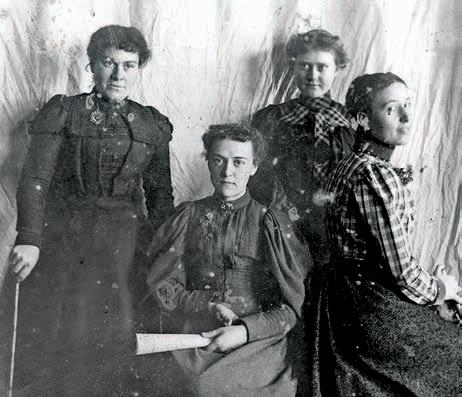
South Washington St. in South Denver and ran there until 1971.
Then, in 1898, the United States went to war with Spain on the island of Cuba as well as in the Philippine Islands. The First Colorado Infantry fought in the Philippines. Rose left her post and went, not as a doctor but as a nurse, to care for the troops. Rose helped run a convalescent hospital in Manila and frequently championed the troops’ issues. She also treated both Americans and Filipinos on the battlefield.
After a year, she returned to Denver and became the health officer for the Denver Public Schools, setting up the first dental clinic for poor children. Then she served as the doctor at the County Poor Farm followed by becoming the first woman to be superintendent of Denver General Hospital.
Finally, in 1917, she opened a sanitarium called Rest-A-While to take care of soldiers returning from World War I. The institution was at 5005 Perry St. in Berkeley. Rose moved to Washington, D.C., and died there in 1927 at the age of 68.
*Compliments of American historian Laurel Thatcher Ulrich, who is credited for coining this popular feminist slogan in 1976.
Dr. Rebecca A. Hunt has been a resident of North Denver since 1993. She worked in museums and then taught museum studies and Colorado, Denver, women’s and immigration history at the University of Colorado Denver until she retired in 2020.
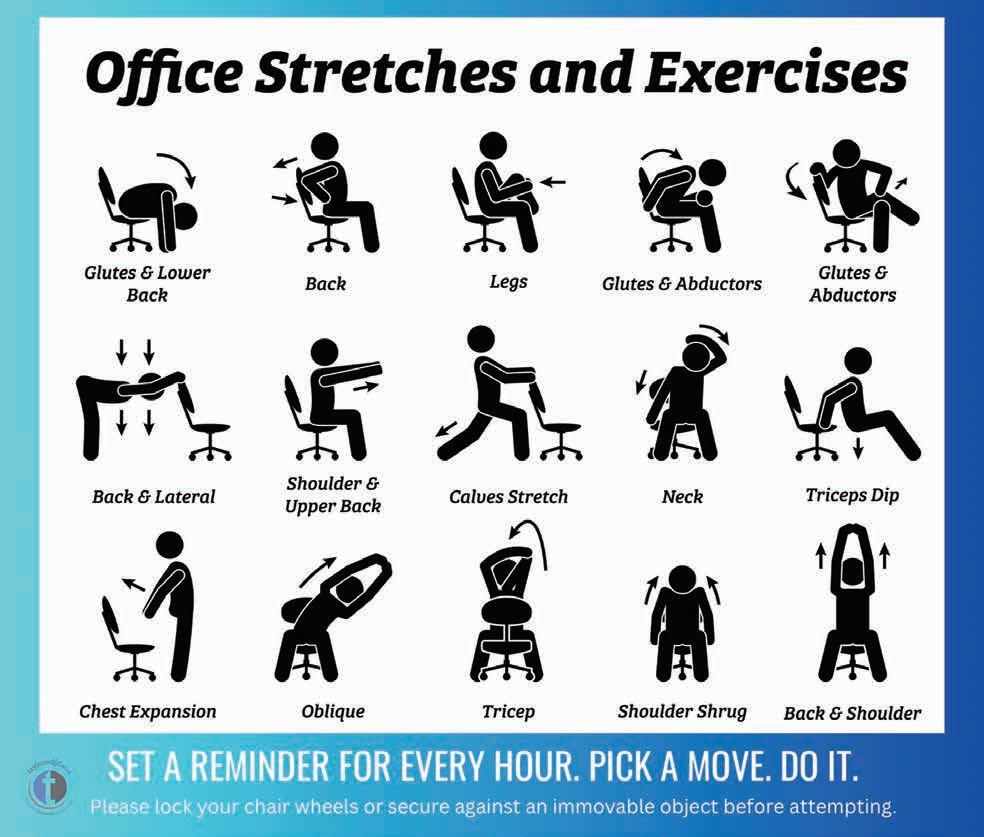
at it, more focused, more comfortable and more creative.
How do you work movement into your day? I’m always looking for new ideas to share so if you have one I hope you’ll let me know. Here’s to moving more, moving better and moving for life.
Erika Taylor is a community wellness insti-
gator at Taylored Fitness, the original online wellness mentoring system. Taylored Fitness believes that everyone can discover small changes in order to make themselves and their communities more vibrant, and that it is only possible to do our best work in the world if we make a daily commitment to our health. Visit facebook.com/erika.taylor.303 or email erika@tayloredfitness.com.
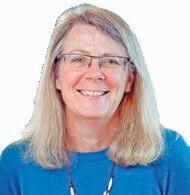 ANNE BUTTON
ANNE BUTTON
At my mother-inlaw’s birthday party last month, someone asked her how old she felt.
“Sixty-five,” she answered, without skipping a beat.
She was turning 95.
Our parents and grandparents have always been older than us, of course, so we imagine they’ve always felt older. The thing no one tells us when we’re younger is that as we continue to age, we’re not necessarily going to feel any different at our core.
It’s the same kind of feeling we get when we go to, say, a 40th high school reunion, which I did last summer. Looking around at classmates pushing 60, you marvel at how old they seem, until you catch a glimpse in the mirror and remember, oh yeah.
How old we feel in our mind can be different than how old we feel physically. My husband, for instance, 61 in chronological time, says that though he feels physically older when his arthritis or gout act up and limit his mobility, most of the time he feels like he’s in his mid-40s.
Scientists have a term for this sense of feeling, in our minds, younger or older than our birth age. “Subjective age,” they call it, and they’ve been studying it since the 1970s, with increased fervor in recent years.
Research on subjective age over lifespans from the University of Virginia in 2018 found that most kids feel older than they really are (which reminds me of a popular put-down from my youth, “Act your age, not your shoe size!”). But this starts to change in the mid20s, and by their 30s about 70% of people feel younger than their actual age. The discrepancy grows over time. More than 80% of 40-somethings feel younger than they are; fewer than 10% feel older.
German research, appropriately called the German Aging Survey, tracked 15,000 people over 24 years and yielded some interesting results about subjective age. Researchers found in 2023 that people born later tend to feel younger than previous generations did. That is, my kids will likely feel younger when they’re my age than I do now.
Studies show that people who feel younger than their chronological age are typically healthier and more resilient than those who
feel older, but researchers haven’t determined cause and effect: whether feeling younger makes people healthier or whether people who are healthier tend to feel younger. Nevertheless, it’s been suggested that simply asking people how old they feel can give medical professionals an indicator of who is most at risk for health problems.
Some critics say the concept of subjective age feeds into ageist stereotypes perpetuated by a culture that prizes youth and devalues age. If old age wasn’t seen as negative, the logic goes, people wouldn’t need to feel younger than they are. A different German study found that in cultures where old age is revered, people can’t wrap their brains around the concept of subjective age. “What do you mean by how old do I feel?” an interviewee in Jordan reportedly said. “I’m 80, so I feel 80.”
Regardless of whether subjective age is seen as an ageist construct, experts agree that our views about aging have a big influence on how we age.
Poring through German Aging Survey data, researcher Susanne Wurm found in 2022 that people who perceive aging as a process of development and continued personal growth live an average of 13 years longer than those who view it as a time of stagnation and neglect. This echoes research on internalized ageism in the United States by Yale professor Becca Levy, which cites a seven-year lifespan dividend for those who view aging in a positive light.
An attitude of setting limits on ourselves, claiming it’s too late or we’re too old for certain plans and activities, seems to be the worst for us.
That bodes well for my sister, whose chronological age is 62 but whose subjective age when we get together is seemingly about 12. She came upon some school kids jumping across the roofs of storage sheds and had to grudgingly remind herself of her responsibilities as a school administrator to stop them.
“It looked so fun,” she told me, “like the chimney sweeps in ‘Mary Poppins.’”
Too bad she couldn’t act her shoe size.
Anne Button has lived in North Denver for nearly 30 years and raised two kids in the neighborhood. She is the founding director of the CU Denver Change Makers program, which helps older adults chart new paths. She can be reached at Anne.Button@ucdenver.edu.
/// KIDS & EDUCATION /// LETTERS FROM
MISS JILL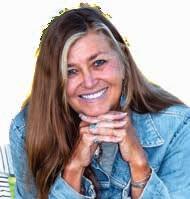 JILL CARSTENS
JILL CARSTENS
Yes! There is a variety of reasons you should pay attention if your child ends up being left-handed.
My own son grew very naturally into his left-handedness, and due to the fact that he was always such a smart and capable child I never looked into how, even in current times, this could pose as a challenge for him. Unfortunately, we still have not completely adapted for folks who are left-handed. Most of the world is set up for the right-handed.
Not receiving support from his early teachers (or me, in my ignorance), my son shared with me after he was older that he adapted to form his letters as best he could by contorting his hand. Handwriting was presented to him only from the right-handed perspective. His pen would smear as he wrote across a page. No wonder he relished the idea of using a keyboard.
Here are some other challenges:
Scissors and many kitchen utensils like can openers and vegetable scrapers are made for the blade to only work if you are right-handed. Notebooks, desks, computer mouses and other school materials are also made for right-handers.
Ten percent of the population is believed to be left-handed. In a 2018 episode of the public television show NOVA, Patricia Cowell,
a professor of cognitive neuroscience at the University of Sheffield in the United Kingdom, pointed out that the existence of left-handers helps to explore the different ways the brain organizes itself under different circumstances.
“If someone is left-handed, their brain organization is going to be different than someone [who] is right-handed.”
– Patricia Cowell, a professor of cognitive neuroscience at the University of Sheffield
“If someone is left-handed, their brain organization is going to be different than someone [who] is right-handed,” she points out.
It has been argued that the recessive gene, which causes left-handedness, persists because it is cognitively advantageous. A 2022 Psychology Today article reported an excess of gifted children among individuals who are left-handed, higher scores on verbal-reasoning tests being one indication. It has been found that left-handers often exhibit good skills in communicating through language, and
See LEFT-HANDED, Page 10




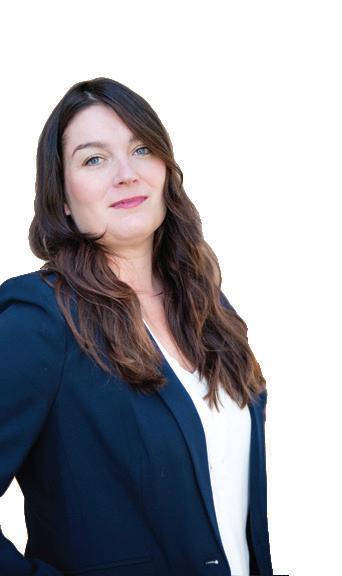






Continued from Page 9
many of them are very creative people. Famous left-handers include Barack Obama, Oprah Winfrey, Leonardo da Vinci, Jimi Hendrix, Ruth Bader Ginsberg, Martina Navratilova, Bill Gates and Babe Ruth.
I almost wonder if these left-handers were exceptional because of the need to overcome the obstacles in their environment due to their handedness; they developed character, grit and resourcefulness! Developmental psychologist Jane M. Healy, Ph.D., asserts in her book “Different Learners” that because a dominant left hand results in more back and forth between the hemispheres of the brain, these folks have more communication between these two sections, which can result in enhanced creative thinking.
Growing research into left-handedness has also found that a higher percentage of people with other neuro diversities such as ADHD or autism are left-handed. This is not a call to assume if you or your child are left-handed that you will develop one of these other challenges, but we need to use this information as a tool. If your child shows signs of a spectrum disorder, left-handedness can be part of the equation in assessing the condition and determining a path forward.
The important thing to be aware of one way or the other is that lefties need support, especially when they are young and beginning to use the materials that will help them to succeed in school.
Shopping outlets like The Left Handed Store specialize in everything you could think of for left-handers, including items for cooking, sports, musical instruments and gardening.
Jill Carstens taught for 30 years and now enjoys writing for this publication. You can view more of her writing on Instagram @lettersfrommissjill. Email her with comments or story ideas at jill@denvernorthstar.com.
Continued from Page 1
Valdez is in the second year of his second term that began in 2022 and will end in 2025. Valdez is on the Energy & Environment and Transportation, Housing & Local Government committees and represents a northeastern portion of North Denver.
Here is a brief rundown of the bills for which Gonzales, Hernández and Valdez are prime sponsors:
SEN. JULIE GONZALES
Creation of 911 Services Enterprise
SB24-139 would create a 911 services enterprise that would charge a 50-cent fee on phone lines in an area with 911 services. The intention behind the fee is that it would help the governing bodies pay for 911 emergency services and various costs relating to 911 services. SB24-139 has been introduced to the Senate and assigned to the Finance Committee.
Planting of Uncertified Potatoes
SB24-137 is a bipartisan measure that is attempting to curb the planting of uncertified potatoes. It will do this by requiring all uncertified potato-seed stock to go through testing that would make sure the potatoes are free from disease or anything else considered harmful to potato crops. SB24-137 has been introduced to the Senate and assigned to the committee on Agriculture and Natural Resources.
Indeterminate Sex Offender Sentencing
SB24-118 would put an end to all indeterminate sex offender sentencing, creating mandatory minimums, and would increase the availability of sex offender treatment for high-risk offenders who are currently in the department of corrections. SB24-118 has been introduced in the Senate and assigned to the Judiciary Committee.
Safe Housing for Residential Tenants
SB24-094 would initiate and clarify the procedures regarding a tenant’s claim of breach of the warranty of habitability. SB24-094 passed as amended out of the Senate Local Government & Housing Committee.
The Regional Air Quality Council (RAQC) is the Front Range’s lead air quality planning agency. We create plans for the state to improve air quality and meet goals set by the U.S Environmental Protection Agency (EPA). The RAQC also runs programs that work to reduce air pollution and improve public health in the greater Denver metro.
Sometimes, when an industrial facility faces fines, we receive those monies to put back into the community. As a result, this summer is your chance to upgrade your gas-powered lawn mower to a clean, quiet, electric option — and help improve the health of your family and community.
Gas-powered mowers have an oversized negative impact on our air quality. They contribute especially to the formation of ground-level ozone, which you cannot see or smell, but is bad for you to breathe. In fact, operating a gas-powered mower for just an hour contributes the equivalent air pollution of driving a car from Denver to Utah. When you use a gas mower, you also breathe in high levels of harmful air pollutants that are released right next to you. But you can improve the air quality in your backyard this year, almost for free.
Utilizing industrial fines, the RAQC is hosting events for residents of targeted communities to trade in old gas-powered equipment for a new electric mower. By also using a new Colorado state discount, you can receive an electric mower that retails for over $400 mostly free – you will only need to pay the tax. This is usually less than $20.
There will be multiple models of electric mowers available at these events available for just the tax. If you prefer to purchase a higher
Streamline Marijuana Regulation
SB24-076 would attempt to make the regulation of existing marijuana licenses more efficient by streamlining the process. SB24-076 was introduced in the Senate and assigned to the Finance Committee.
Voting for Confined Eligible Electors
SB24-072 would make sure that eligible voters who are currently confined at a county jail or detention center can vote. The bill would have county sheriffs designate one individual to facilitate voting at each jail or detention center by providing information to confined eligible electors about voter registration and eligibility as well as making sure there is access to voter registration resources. SB24-072 was passed, as amended, to the Appropriations Committee.
Recidivism Definition Working Group
SB24-030 would create a new working group to establish a clear definition of “recidivism.” State entities that do data collections or report on recidivism would use this definition to help guide their work. SB24-030 has passed through the House and Senate and has been sent to the Governor.
Study Metrics to Measure Criminal Justice System Success
SB24-029 would create a working group to examine the efficacy of the criminal justice system using other metrics and methods than recidivism. SB24-029 passed through the Senate Judiciary Committee and was referred unamended to the Appropriations Committee.
Criminal and Juvenile Justice System Process Study
SB24-027 would have the division of criminal justice conduct a study to look at how individuals go through the different stages of the criminal and juvenile justice processes. SB24-027 passed through the Senate Judiciary Committee and was referred unamended to the Appropriations Committee.
REP. TIM HERNÁNDEZ
School Graduation Attire
HB24-1323 would prohibit any school from not allowing a student at any level of education to wear an object of religious or cultural significance as part of their graduation
end model mower, you just pay the difference after the discounts provided.
This program is open to residents of the following zip codes: 80022, 80024, 80221, 80640, 80229, 80260, 80216, 80205, 80211, 80207, 80238, 80239, 80249.
Denver
North Star readers: if you’re in the Sunny side, Chaffee Park, or other neighborhoods with one of the above zip codes, you qualify!
You don’t need to sign up in ad vance. Simply show up at one of the events we’re hosting with Ace Hard ware with your old gas mower, with the abili ty to bring home a mower. Electric models are about the same size and weight as your old gas equipment. While you must live in one of the zip codes listed, you do not need to live in the specific community of the event. Please bring an ID, utility bill, or other proof of your residency in one of the specified zip codes.

Please also note you do need to bring a gas-powered mower for us to recycle to participate.
• April 13, 2024: Commerce City Ace Hardware: 6900 Eudora Dr, Commerce City, CO 80022
• April 20, 2024: Mile High Ace Hardware & Garden: 2700 W 104th Ave, Federal Heights, CO 80234
• April 27, 2024: Chambers Place Ace Hardware: 4830 Chambers Road Denver CO 80239
attire at a graduation ceremony. HB24-1323 passed through the House Education Committee and has been sent to the House Committee of the Whole.
Prohibit Certain Weapons Used in Mass Shootings
HB24-1292 establishes the term “assault weapon” in law and bans the manufacturing and sale of such weapons, as well as prohibits the ownership of certain rapid-fire weapons. HB24-1292 was introduced to the House and assigned to the Judiciary Committee.
Prohibition Against Employee Discipline
HB24-1260 prohibits an employer from making an employee attend meetings, listen or view communications that contain religious or political subject matter, except when required for their job duties. It would also prohibit employees from facing disciplinary action if they refuse to engage with this kind of material. HB24-1260 was introduced in the House and assigned to the Business Affairs & Labor Committee.
Supports for Youth in Juvenile Justice System
HB24-1216 creates a bill of rights for K-12 students who are involved with the criminal or juvenile justice system. It would look to provide students with resources to help them graduate as well as career readiness pathways. HB24-1216 was introduced in the House and assigned to the Education Committee.
Creating the Chicano Special License Plate
HB24-1105 would create a special license plate that will help support the Latin American community through donations. HB241105 passed the House Finance Committee and was referred amended to the House Appropriations Committee.
REP. ALEX VALDEZ
Tax Credits for Quantum Industry Support
HB24-1325 is a bipartisan approach that would create two tax incentives to support the development of the quantum technology industry in Colorado. HB24-1325 was introduced in the House and assigned to
May 4, 2024 – IF NEEDED:
Location TBD near Globeville or Sunnyside neighborhoods
*Please visit mowdownpollution.org for updates on times and locations. This program utilizes one-time funding, and this offer is only available as funding permit. If funds are exhausted in the first three events, there will not be
Meeting Colorado’s air quality goals takes all of us. Regulators and advisory groups are working on reducing industrial air pollution, but reducing individual gas emissions, like those from gas-powered mowers and cars, can help cut the ozone causing pollution on the Front Range in half! Plus, electric mowers are much quieter, require less maintenance, and you will no longer have to buy or handle gas. Upgrading your personal lawn mower from gas to electric can make a really big difference for air quality in your community, as well as for the health of you and your family.
Please visit mowdownpollution.org and select “residential program” or email mowdownpollution@raqc.org for more information.
Paid Advertisement by the Regional Air Quality Council. This project was undertaken in connection with the settlement of an enforcement action taken by the U.S. Environmental Protection Agency for alleged violations of federal laws.
the Finance Committee.
Single-Exit Stairway Multifamily Structure
HB24-1239 would require a local government to adopt a building code to allow five stories of a multifamily residential building to be served by a single stairwell exit. HB24-1239 was introduced in the House and was assigned to the Transportation, Housing & Local Government Committee.
Electric Vehicle Charging System Permits
HB24-1173 would help expedite the permit process for the approval of electric motor vehicle charging systems for counties and municipalities. The bill would also require local government boards to create an application procedure for electric vehicle charger permits to install electric vehicle charging systems. HB24-1173 was introduced to the House and assigned to the Energy & Environment Committee.
Tax Credit Commercial Building
Conversion
HB24-1125 would create a new refundable tax credit that could be claimed in tax years commencing on or after 2026, and before 2036. The credit can be claimed for certain costs in relation to the conversion of a commercial structure into a residential structure. HB24-1125 passed in the House Finance Committee and has been referred, as amended, to the Appropriations Committee.
HB24-1069 would create the electronic smoking device recycling strategies advisory group. This group would make strategic recommendations on how to recycle single-use electronic smoking devices in a manner that would be beneficial for the environment. HB24-1069 passed through the Energy & Environment Committee and was referred, as amended, to the Appropriations Committee.
Editor’s note: The status of these bills may have changed since The Denver North Star went to print. Visit https://leg.colorado.gov/bills to search by bill number or topic to see where a bill you’re interested in currently stands. You can use that same website to contact elected officials and learn about ways to view and participate in proceedings.
Structure local governallow five building to HB24-1239 was assigned Local GovSystem Permits expedite the perelectric mocounties would also recreate an electric vehicle electric vehicle was introassigned to the Committee. Building refundable tax years and before for certain of a comstructure.
Finance as amendCommittee. Electronic electronic strategies advisory strategic recsingle-use manner that environment. Energy & Enreferred, as Committee. bills may North Star https://leg.colorado.gov/bills see where a stands. You contact elected view and par-
Continued from Page 1
practices. Sometimes that took the form of local lodge leaders pressing for change, other times lodges were forced to admit new categories of members when they were sued or a local government threatened to pull their liquor license over failures to comply with civil rights laws.
When Garrett Phillips took over as exalted ruler of Denver No. 17 in April 2022, the year after he had been elected as the lodge’s Elk of the Year, he prioritized the lodge’s inclusiveness efforts. The board at the time was made up of several women and people of color and one person who identified at LGBTQ. Overall membership numbers had shifted. It became, on average, younger, and it was attracting greater numbers from groups that had historically been left out by the Elks.
On Oct. 22, 2022, Garrett Phillips presided over a well-attended membership meeting where three changes to the lodge’s by-laws were to be considered. Lodge leadership sought to replace male-only pronouns with gender neutral terms. They also wanted to decrease the number of member meetings from 24 per year to 16 and increase annual membership dues from $115 to $200.
A heated discussion consumed the meeting. Phillips had to call the meeting to order several times to settle outbursts from members.
“There was one in particular, who I'd never seen,” said Theresa Peña, Denver native and former DPS school board president, “who I've come to know was John Amen. He’s kind of a legend in Colorado, even at the national level, and a very important member.”
“He was rude and disrespectful,” Peña continued. “I’d never witnessed that kind of behavior in my time at the lodge since joining in April. It's a friendly place. We're trying to do good work and volunteer in the community.”
By evening’s end, despite a contentious and lengthy process, the proposed bylaws changes were passed, with amendments, by a vote of members. A local lodge’s decisions would typically be then sent up the Elks hierarchy for sign-offs.
Instead, on Nov 18, 2022, Phillips received a “Notice of Emergency Executive Order” removing him from the office of exalted ruler. The order declared Phillips ineligible from holding any office at an Elks lodge for three years and it suspended his club privileges, also for three years.
The order contained eight charges against Phillips, and noted that the move was recommended by “State Sponsor John D. Amen, Past Grand Exalted Ruler.”
The charges included three pertaining to how Phillips presided over the Oct. 22 meeting, one claiming Phillips had allowed new air conditioning to be installed at the local lodge without proper national sign-off, and another that Phillips had failed to obtain “an excuse for good cause” when he missed a regional leadership meeting to attend his daughter’s soccer tournament.
All eight charges were ultimately dismissed, but not before a lengthy appeal and internal court-like process from November 2022 to January 2024.
“What we found out is that, with a big organization,” Phillips said, “if you try to make too many changes, there's a national organization that's in control of it and they will shut it down.”
Peña wrapped up her active time with the lodge last spring when her term as leading knight ended and she had completed her work on the lodge’s annual scholarship cycle. She renewed her membership one last time because she wanted to be a member in good standing when Phillip’s appeal took place. This month, Peña said, she will allow her membership to lapse.
Peña and another member filed an internal Elks charge against Amen for his conduct at the October meeting. The parties would have gone to mediation, but the matter was dropped by the national organization when Amen transferred his membership to a lodge in Colorado Springs, where he now lives.
Beyond the three changes on the agenda that October 2022, Peña’s sense was that some, Amen in particular, just wanted things to stay the same. They questioned changing rules that had been working for the Elks for 100 years.
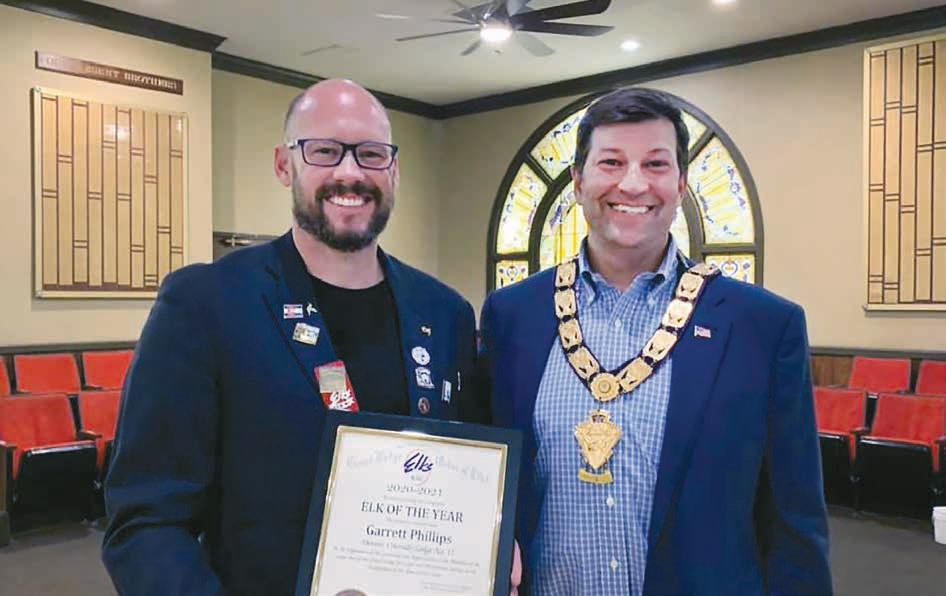
After the meeting, Peña began researching Elks history.
“If you go back and look at the Elks constitution, it's not gender neutral,” Peña said. “It’s not very friendly to women. It's silent on any kind of person of color perspective.”
Lisa Ramirez, a North Denver parent who has been involved in neighborhood schools for many years, sent a letter of resignation to the national Elks organization last fall. She said she respects the decisions of friends who’ve decided to remain members, who want to continue pursuing change within the lodge, but she’s no longer willing to invest her own energy there.
Ramirez expressed disappointment in the absence of a democratic process prior to the abrupt removal of Phillips from leadership. She said she was struck by a double standard that put Phillips through months of defending himself, while those who had made unsubstantiated charges against him faced no repercussions.
“I could not in good conscience be part of the Elks any longer. You become part of the Elks national organization when you join as a member of a local lodge. I couldn’t remove myself from that and I just didn't want to condone that kind of behavior,” Ramirez said. “I think it's still a good old boy network. Our local chapter was amazing for a while. But seeing some of the things Garrett was accused of as he was trying to make it more inclusive? That told me all I needed to know.”
Michael Encinas, North Denver native and City Council Pro Tem Amanda Sandoval’s husband, said both he and Sandoval were extremely disappointed when Phillips was ousted. Encinas was a lodge trustee at the time and had pitched in at the lodge in a variety of ways, including help at the building during COVID-19, arranging for $10,000 a month in rental income from a construction company operating nearby, and teaming up with Phillips and Denver North’s golf coach Ron Ramirez to install golf simulators at the lodge for student golfers to practice during the winter.
“My daughter played golf at North,” Encinas said. “With the girls golf program in high school athletics, they catch the short end of the stick. Their season starts in the spring. We were goofing off down in that room one day. And we said we should put a net down here and hit some golf balls.”
Talk turned to fundraising and what it would take to bring simulators into the space.
Today, the garden level of the building’s north wing serves as the Denver North golf team’s offseason training space. And when golfers from Denver North aren’t training, Elks members who’ve paid for an additional golf membership can use it themselves. The simulators mimic courses as renowned as Pebble Beach and as familiar to locals as Willis Case.
Encinas, who recruited over 25 new members while he was active, has no plans to continue as an Elk.
“It's not a money thing for me. It's the principle,” Encinas said. “It’s what they did to my friend. Especially after everything we accomplished at the place.”
He described Amen’s behavior at the October 2022 meeting as that of a ”grouchy, bigoted, old white man who didn't like to see the changes that were happening at the Elks Lodge.”
“We were trying to change those bylaws to
make it more inclusive, so it wasn't so geared towards men,” Encinas said. “On our board, we covered it. You had three persons of color, you had one LGBTQ person, you had four women. We were rocking and rolling, getting stuff done.”
According to Encinas, there was also some infighting. He said former Exalted Ruler Jim Wolf, the one who made it onto the pages of Westword for the lodge’s first diversity statement, didn’t like what lodge leadership at the time was doing. So he sought the support of a friend he’d made in Elks circles: John Amen.
“And then John Amen dropped the hammer on us,” Encinas said.
John Amen declined to comment for this story.
Because Elks take an oath not to discuss internal matters with non-members, current Denver lodge members The Denver North Star reached declined to comment on the details of Phillip’s removal as exalted ruler.
Wolf declined to comment on Amen’s role in Phillips’ removal from office, but he spoke to the impact of the abrupt change on the lodge.
“It was extremely disruptive to all the good work that we had been doing for the past several years,” Wolf said. “My wife and I worked hand in hand with Garrett during that entire time to build up the lodge to what it was and make the lodge an instrumental part of the community.”
“But the lodge came together and supported Garrett,” Wolf continued. “And since then, the lodge has continued to grow and strengthen. Membership continues to increase and I think we're stronger for it, to be honest with you.”
Denver No. 17 has 582 members now, according to Secretary Travis Caldwell.
While Caldwell and current Exalted Ruler Chris Jeffrey declined to comment on Phillip’s removal, they provided The Denver North Star
Continued from Page 8
effective stomach soother.
Finally, since urban living already does enough to stink up your air, don’t add to it by cleaning with crappy chemicals. Choose your cleaning products wisely, and remember to
Continued from Page 6
his fellow villagers. Now Delbrot is being pursued by a warrior who wants the bracelet for his dark agenda. Unless you’re a zombie, this story is definitely of the sliding-glassdoor variety.
After the Apocalypse” by Carol Scheina, a community bands together to help a young woman who can’t hear after her hearing aid batteries die and there are none left to replace them. As someone with hearing loss, I found this “mirror” to be revelatory and a touch unnerving.
A window into the world of a person with schizophrenia is seen in “Suffer the Silence” by Ellis Bray. The unnamed protagonist, who can no longer afford their psych meds, is trying to determine where they are in relation to reality as a mysterious and frantic woman begs them to help find her baby. The imag-
with a tour of the lodge and they shared about lodge history.
Space at the lodge was made available to community groups nearly 20 times last year, for events like Denver CASA’s (Court Appointed Special Advocates) Colorado’s Christmas toy give-away, blood drives, Denver North High School sports and arts banquets and fundraisers, and Veteran's memorial services.
And even with a system Caldwell said grossly under reports volunteer hours, members recorded roughly 1,000 hours spent volunteering in the community.
Caldwell said the lodge was particularly proud of the role it played in supporting recent immigrants living at the nearby Quality Inn and neighboring encampment that surrounded their building. In partnership with the city and state, the lodge was used for clinics to help expedite the processing of work permits for approximately 150 people.
The lodge gave over $40,000 last year to organizations like Special Olympics Colorado, Denver CASA, Servicios de la Raza, Laradon Hall and Bienvenidos Food Bank. And they gave out $20,000 in scholarships and some smaller, individual grants to veterans for things like rental assistance.
And Caldwell said they’re actively planning their annual fundraiser for Special Olympics Colorado on May 20. The community is invited.
Phillips reflected back on what he and others accomplished in growing lodge membership to reflect the people of Denver. “The old white people around there, they didn't like that at all,” he said. “And one of the guys was in a position that he could just say, OK, you're out.”
“The end result is that [leadership] is back to like 90% white people,” Phillips said. “White, straight cisgendered males that run that organization, including the local Lodge.”
Phillips received notification on Feb. 5 that his case within the Elks quasi-judicial system had finally been put to rest. All charges have been dropped, and he had agreed to a lifetime ban from holding office at any level in the Elks organization. A $1,000 deposit, the fee required to initiate the appeal process, was returned. Phillips notified members, many of whom had pitched in to cover the fee, that he would donate the $1,000 to the North Side High School Alumni Association’s scholarship program.
As life moves on, for Phillips and others who left, as well as for the lodge and its roster of social-plus-service activities, it remains unclear if, how and when the Elks organization will completely shed itself of its exclusive past.
Denver Elks Lodge No. 17 is on solid ground when it points to its good works, cheap drinks and million dollar view of downtown.
But it may take a few more rounds of sparring and tangled antlers before the Elks truly become a community organization.
step outside if you gotta light up or vape, to dissipate cigarette and cannabis smoke.
Erin Olyer Rohlf is a licensed clinical social worker (LCSW), professional therapist and founder of Higher Healing and Wellness, LLC. Call her at 720-644-1400 or email her at eorohlf@gmail.com for information or to suggest ideas for future columns.
ery is haunting and the fear evoked by the situation is visceral.
In “A Peril of Being Human” by Julie Reeser, a shapeshifting therapist changes her physical being to match the expectations of her clients. In a fortuitous twist, she goes on her first date in three years only to notice her date looks remarkably like her. It’s a sliding glass door into a shapeshifter’s world, but also a metaphor for the human need for connection and belonging.
Denver Public Library is celebrating Disability Awareness Month in March, and what better way to observe it than to check out books, movies and music by disabled creators? Check out “Soul Jar” at a Denver Public Library branch near you and find more great titles at denverlibrary.org.
Wendy Thomas is a librarian at the Smiley Branch Library. When not reading or recommending books, you can find her hiking with her dogs.


3

